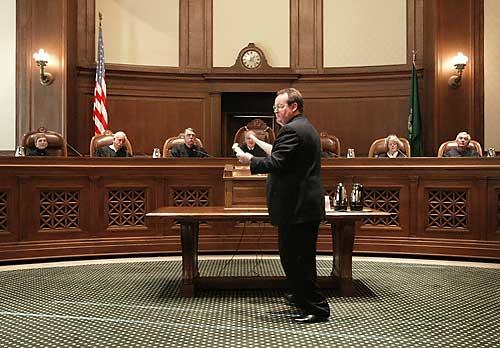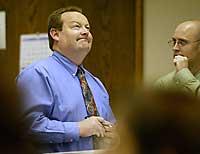 |
 |
 |
|
|
Monday, April 5, 2004 Attorney profited, but his clients lost By Ken Armstrong, Florangela Davila and Justin Mayo Last year, Grant County public defender Thomas J. Earl handled 413 — a staggering figure that eviscerated the chances of a vigorous defense. At that rate, Earl could devote an average of only four hours per case, according to a formula used by the defenders association. Or, to use another measure: When Earl lost his job two months ago, judges drafted 49 lawyers in a desperate scramble to fill the vacuum. But as daunting as his caseload was, Earl didn't complain. Indeed, he invited the work — and the money it paid.
As administrator of a public-defense contract for the past three years, Earl determined caseloads and compensation for public defenders in Grant County Superior Court. The more cases he kept for himself, the fewer he had to dole out. And the fewer he doled out, the more money he kept.
That accounts only for his public-defense work. Earl also maintained a private practice. And on top of that, according to allegations by the Washington State Bar Association, Earl solicited money from court-appointed clients he was supposed to represent for free. At a disciplinary hearing last year, an attorney for the bar picked up a green marker and drew a dollar sign. "Mr. Earl," she said, "put a price tag on the administration of justice." The bar described how Earl received a crush of court-appointed cases; how he got paid the same for those cases, no matter how hard he worked; and how he was allowed to keep a private practice on the side. The hearing officer concluded that Grant County's system invites conflict and abuse — and that Tom Earl accepted that invitation. Similar systems can be found throughout Washington, where local governments have placed themselves — and countless indigent defendants — at the mercy of attorneys working under fixed-fee contracts, hoping personal integrity prevails where financial motivation fails.
A CASE STUDY IN PUBLIC DEFENSE
In 1996, John W. Jackson stood trial in Grant County Superior Court, accused of selling drugs. Nicknamed "Cabbie" because he used to drive a taxicab, Jackson was 59, poor, and had a prior criminal record, including drug arrests. The state's case hinged on two witnesses: a confidential informant who said he bought cocaine from Jackson, and an undercover cop who said he saw the deal go down. To defend Jackson, an attorney would need to scrutinize the state's case and dig around to determine if the prosecution's witnesses were credible. But when Tom Earl received the Jackson case in November 1995, his felony caseload for the year had already topped 300 — and was growing. The time he had to devote to any single case was minimal. So was his financial incentive. On Jan. 1, 1996, the law firm of Earl & Earl took over the public-defense contract for Grant County Superior Court. (The firm's members included Earl's relatives, but not Tom Earl himself.) The firm hired Tom Earl to handle 40 percent of the court-appointed cases, and paid him $156,000 a year, no matter how much time he spent on those cases. Tom Earl's agreement also allowed him to keep a private practice. So the more time he spent on court-appointed clients, the less time he would have for paying ones. And at the time, he was facing extreme financial pressure: The Internal Revenue Service had recently ordered him to pay more than $100,000 in back taxes. With so little time to spare, Earl's preparation in Jackson's case was so minimal that he went to trial without even interviewing the state's star witness, James Allen Anderson.
'CRAZY JIMMY'
Police in Grant County knew him as "The Plate." This was a clever play on words: Anderson has a steel plate concealed in his lower leg, but police used the name to conceal Anderson's identity as a confidential drug informant. Others in Grant County knew Anderson by other names: "Crazy Jimmy." "Shaky Jimmy." "Jimmy the Weasel." The Anderson they knew couldn't differentiate fact from fantasy. In an interview with The Seattle Times, Anderson said he solved the Oklahoma City bombing, the JonBenet Ramsey murder and countless other crimes — all before they happened. Asked how, he pointed to his head. "This," he said. "You think with your mind, you put the cases together, and you put it down on paper." Anderson said he received assignments directly from presidents John F. Kennedy and Jimmy Carter, that he had a Marine Corps command at Camp Pendleton and that he's worked as a government secret agent for 44 years. Anderson is 51 years old.
VINDICATION — TOO LATE
John Jackson's case went to trial on June 11, 1996. On that same day, the Washington Court of Appeals ruled that Tom Earl had done such a lousy job defending a previous client that it vacated the man's rape conviction and ordered a new trial. Earl didn't conduct an adequate investigation, the court found. When potential witnesses tried to offer evidence that might help his client, Earl didn't even return their calls. History was about to repeat itself. In the opening moments of his trial, Jackson complained to the judge that his defense attorney had done nothing to prepare. "What would you have Mr. Earl do?" the judge asked. "I would have him at least talk to me," Jackson said. The prosecution put three people on the stand, including the undercover police officer and Anderson, the confidential informant. Earl's cross-examination of Anderson failed to disclose any hint of mental illness. The defense called no witnesses. Jackson was convicted of selling cocaine and sentenced to six years and four months in prison. From his prison cell, Jackson appealed. Five years later, Anderson was back on the stand. This time he was questioned by Nancy Tenney, an assistant federal public defender who had investigated his background and who proceeded to shred the case against Jackson. Tenney asked Anderson how he came to be a police informant. Anderson replied that in 1993 or 1994, he had called Bryan Pratt, a Grant County sheriff's deputy, and offered to direct him to about seven ounces of white powder. The two met the next day.
|
|
||||||||||||||||||||||
seattletimes.com home
Home delivery
| Contact us
| Search archive
| Site map
| Low-graphic
NWclassifieds
| NWsource
| Advertising info
| The Seattle Times Company


